高中英语独立主格结构
- 格式:doc
- 大小:51.00 KB
- 文档页数:6
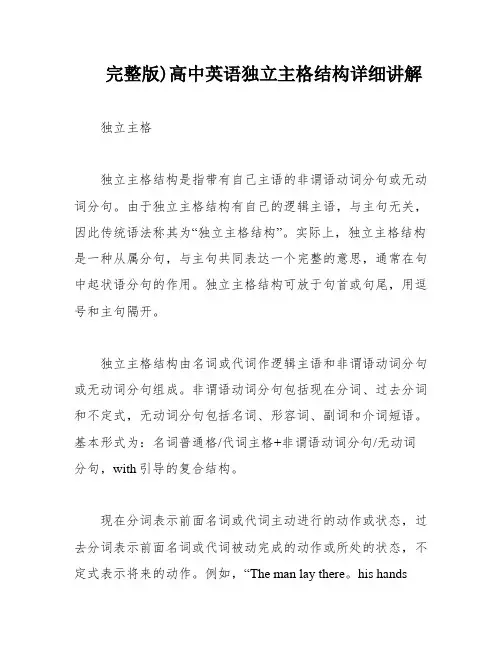
完整版)高中英语独立主格结构详细讲解独立主格独立主格结构是指带有自己主语的非谓语动词分句或无动词分句。
由于独立主格结构有自己的逻辑主语,与主句无关,因此传统语法称其为“独立主格结构”。
实际上,独立主格结构是一种从属分句,与主句共同表达一个完整的意思,通常在句中起状语分句的作用。
独立主格结构可放于句首或句尾,用逗号和主句隔开。
独立主格结构由名词或代词作逻辑主语和非谓语动词分句或无动词分句组成。
非谓语动词分句包括现在分词、过去分词和不定式,无动词分句包括名词、形容词、副词和介词短语。
基本形式为:名词普通格/代词主格+非谓语动词分句/无动词分句,with引导的复合结构。
现在分词表示前面名词或代词主动进行的动作或状态,过去分词表示前面名词或代词被动完成的动作或所处的状态,不定式表示将来的动作。
例如,“The man lay there。
his handstrembling.”,“So many students being ab sent。
the meeting had to be put off.”,“The boy lay on his back。
his hands crossed under his head.”,“He suggested going for a ic。
Mary to provide the food.”。
在独立主格结构中,being或havingbeen有时可以省略。
These are the first two books。
and the third one is set to be released next month。
We will gather at 7:30.and the n will XXX 8.Many people。
including women and children。
joined in the work。
He XXX。
The XXX。
so we had to wait outside for a while。
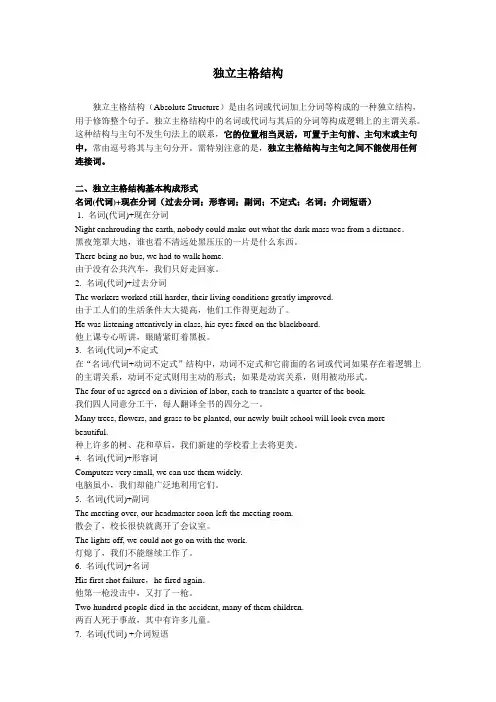
独立主格结构独立主格结构(Absolute Structure)是由名词或代词加上分词等构成的一种独立结构,用于修饰整个句子。
独立主格结构中的名词或代词与其后的分词等构成逻辑上的主谓关系。
这种结构与主句不发生句法上的联系,它的位置相当灵活,可置于主句前、主句末或主句中,常由逗号将其与主句分开。
需特别注意的是,独立主格结构与主句之间不能使用任何连接词。
二、独立主格结构基本构成形式名词(代词)+现在分词(过去分词;形容词;副词;不定式;名词;介词短语)1. 名词(代词)+现在分词Night enshrouding the earth, nobody could make out what the dark mass was from a distance.黑夜笼罩大地,谁也看不清远处黑压压的一片是什么东西。
There being no bus, we had to walk home.由于没有公共汽车,我们只好走回家。
2. 名词(代词)+过去分词The workers worked still harder, their living conditions greatly improved.由于工人们的生活条件大大提高,他们工作得更起劲了。
He was listening attentively in class, his eyes fixed on the blackboard.他上课专心听讲,眼睛紧盯着黑板。
3. 名词(代词)+不定式在“名词/代词+动词不定式”结构中,动词不定式和它前面的名词或代词如果存在着逻辑上的主谓关系,动词不定式则用主动的形式;如果是动宾关系,则用被动形式。
The four of us agreed on a division of labor, each to translate a quarter of the book.我们四人同意分工干,每人翻译全书的四分之一。
Many trees, flowers, and grass to be planted, our newly-built school will look even more beautiful.种上许多的树、花和草后,我们新建的学校看上去将更美。
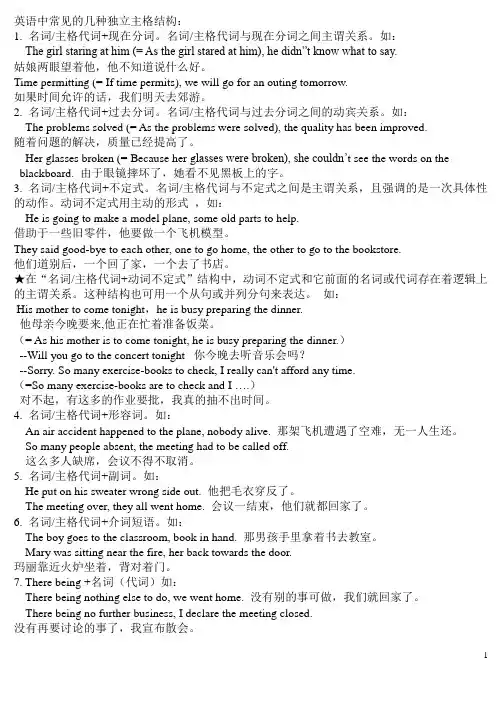
英语中常见的几种独立主格结构:1. 名词/主格代词+现在分词。
名词/主格代词与现在分词之间主谓关系。
如:The girl staring at him (= As the girl stared at him), he didn”t know what to say.姑娘两眼望着他,他不知道说什么好。
Time permitting (= If time permits), we will go for an outing tomorrow.如果时间允许的话,我们明天去郊游。
2. 名词/主格代词+过去分词。
名词/主格代词与过去分词之间的动宾关系。
如:The problems solved (= As the problems were solved), the quality has been improved.随着问题的解决,质量已经提高了。
Her glasses broken (= Because her g lasses were broken), she couldn’t see the words on the blackboard. 由于眼镜摔坏了,她看不见黑板上的字。
3. 名词/主格代词+不定式。
名词/主格代词与不定式之间是主谓关系,且强调的是一次具体性的动作。
动词不定式用主动的形式,如:He is going to make a model plane, some old parts to help.借助于一些旧零件,他要做一个飞机模型。
They said good-bye to each other, one to go home, the other to go to the bookstore.他们道别后,一个回了家,一个去了书店。
★在“名词/主格代词+动词不定式”结构中,动词不定式和它前面的名词或代词存在着逻辑上的主谓关系。
这种结构也可用一个从句或并列分句来表达。
如:His mother to come tonight,he is busy preparing the dinner.他母亲今晚要来,他正在忙着准备饭菜。
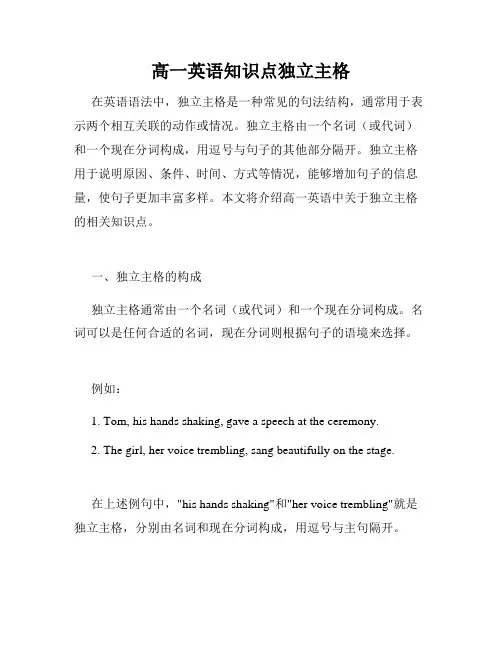
高一英语知识点独立主格在英语语法中,独立主格是一种常见的句法结构,通常用于表示两个相互关联的动作或情况。
独立主格由一个名词(或代词)和一个现在分词构成,用逗号与句子的其他部分隔开。
独立主格用于说明原因、条件、时间、方式等情况,能够增加句子的信息量,使句子更加丰富多样。
本文将介绍高一英语中关于独立主格的相关知识点。
一、独立主格的构成独立主格通常由一个名词(或代词)和一个现在分词构成。
名词可以是任何合适的名词,现在分词则根据句子的语境来选择。
例如:1. Tom, his hands shaking, gave a speech at the ceremony.2. The girl, her voice trembling, sang beautifully on the stage.在上述例句中,"his hands shaking"和"her voice trembling"就是独立主格,分别由名词和现在分词构成,用逗号与主句隔开。
二、独立主格的用法1. 表示原因当独立主格表示原因时,它往往用于解释一个动作或情况的原因。
例如:1. The weather being fine, we decided to go for a picnic.2. The deadline approaching, he worked day and night to finish the project.2. 表示条件独立主格可用于表示一个动作或情况发生的条件或前提。
例如:1. The exam finished, the students were relieved.2. The rain stopping, we went out for a walk.3. 表示时间独立主格可以用来表示与主句的动作或情况同时发生的时间。
例如:1. The bell ringing, the students lined up for class.2. The sun setting, the sky turned a beautiful shade of orange.4. 表示方式独立主格用于描述主句中的动作或情况的方式或态度。
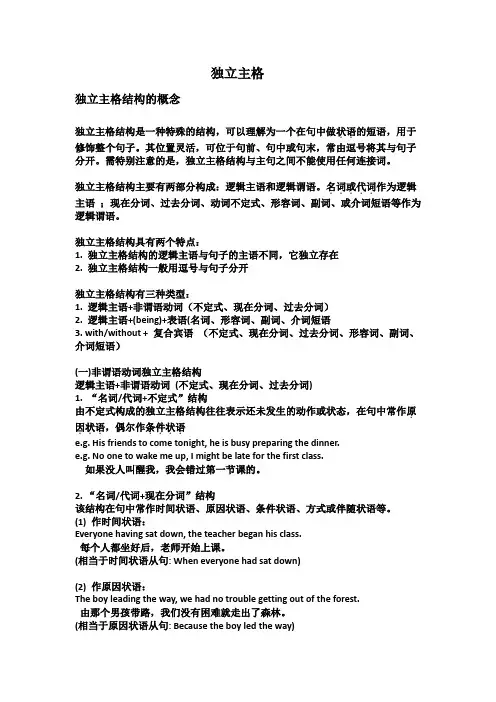
独立主格独立主格结构的概念独立主格结构是一种特殊的结构,可以理解为一个在句中做状语..的短语,用于修饰整个句子。
其位置灵活,可位于句前、句中或句末,常由逗号将其与句子分开。
需特别注意的是,独立主格结构与主句之间不能使用任何连接词。
独立主格结构主要有两部分构成:逻辑主语和逻辑谓语。
名词或代词.....作为逻辑主语;现在分词、过去分词、动词不定式、形容词、副词、或介词短语等作为逻辑谓语。
独立主格结构具有两个特点:1. 独立主格结构的逻辑主语与句子的主语不同,它独立存在2. 独立主格结构一般用逗号与句子分开独立主格结构有三种类型:1. 逻辑主语+非谓语动词(不定式、现在分词、过去分词)2. 逻辑主语+(being)+表语(名词、形容词、副词、介词短语3. with/without + 复合宾语(不定式、现在分词、过去分词、形容词、副词、介词短语)(一)非谓语动词独立主格结构逻辑主语+非谓语动词(不定式、现在分词、过去分词)1. “名词/代词+不定式”结构由不定式构成的独立主格结构往往表示还未发生的动作或状态,在句中常作原.因状语.......,偶尔作条件状语e.g. His friends to come tonight, he is busy preparing the dinner.e.g. No one to wake me up, I might be late for the first class.如果没人叫醒我,我会错过第一节课的。
2.“名词/代词+现在分词”结构该结构在句中常作时间状语、原因状语、条件状语、方式或伴随状语等。
(1) 作时间状语:Everyone having sat down, the teacher began his class.每个人都坐好后,老师开始上课。
(相当于时间状语从句: When everyone had sat down)(2) 作原因状语:The boy leading the way, we had no trouble getting out of the forest.由那个男孩带路,我们没有困难就走出了森林。
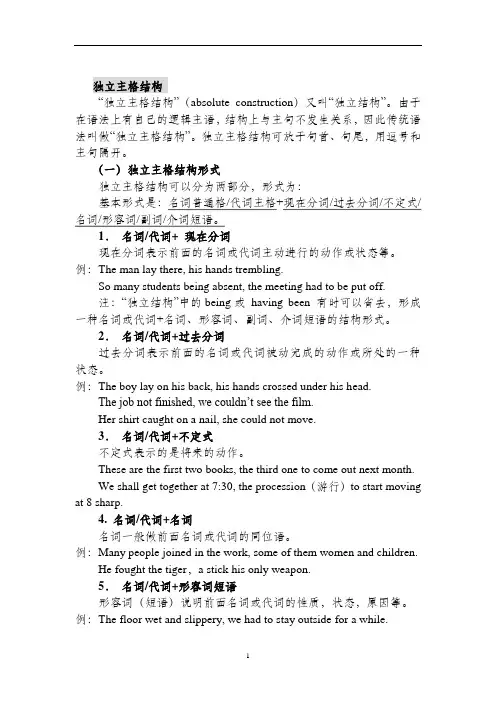
独立主格结构“独立主格结构”(absolute construction)又叫“独立结构”。
由于在语法上有自己的逻辑主语,结构上与主句不发生关系,因此传统语法叫做“独立主格结构”。
独立主格结构可放于句首、句尾,用逗号和主句隔开。
(一)独立主格结构形式独立主格结构可以分为两部分,形式为:基本形式是:名词普通格/代词主格+现在分词/过去分词/不定式/名词/形容词/副词/介词短语。
1.名词/代词+ 现在分词现在分词表示前面的名词或代词主动进行的动作或状态等。
例:The man lay there, his hands trembling.So many students being absent, the meeting had to be put off.注:“独立结构”中的being或having been 有时可以省去,形成一种名词或代词+名词、形容词、副词、介词短语的结构形式。
2.名词/代词+过去分词过去分词表示前面的名词或代词被动完成的动作或所处的一种状态。
例:The boy lay on his back, his hands crossed under his head.The job not finished, we couldn’t see the film.Her shirt caught on a nail, she could not move.3.名词/代词+不定式不定式表示的是将来的动作。
These are the first two books, the third one to come out next month.We shall get together at 7:30, the procession(游行)to start moving at 8 sharp.4. 名词/代词+名词名词一般做前面名词或代词的同位语。
例:Many people joined in the work, some of them women and children.He fought the tiger,a stick his only weapon.5.名词/代词+形容词短语形容词(短语)说明前面名词或代词的性质,状态,原因等。

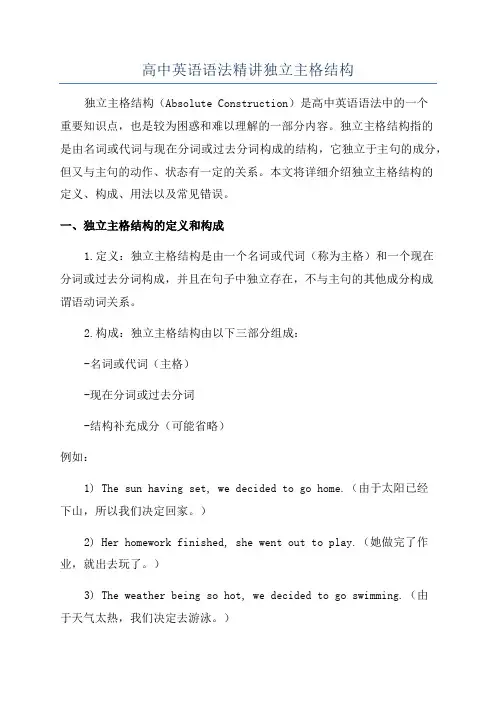
高中英语语法精讲独立主格结构独立主格结构(Absolute Construction)是高中英语语法中的一个重要知识点,也是较为困惑和难以理解的一部分内容。
独立主格结构指的是由名词或代词与现在分词或过去分词构成的结构,它独立于主句的成分,但又与主句的动作、状态有一定的关系。
本文将详细介绍独立主格结构的定义、构成、用法以及常见错误。
一、独立主格结构的定义和构成1.定义:独立主格结构是由一个名词或代词(称为主格)和一个现在分词或过去分词构成,并且在句子中独立存在,不与主句的其他成分构成谓语动词关系。
2.构成:独立主格结构由以下三部分组成:-名词或代词(主格)-现在分词或过去分词-结构补充成分(可能省略)例如:1) The sun having set, we decided to go home.(由于太阳已经下山,所以我们决定回家。
)2) Her homework finished, she went out to play.(她做完了作业,就出去玩了。
)3) The weather being so hot, we decided to go swimming.(由于天气太热,我们决定去游泳。
)二、独立主格结构的用法独立主格结构常用于下面几种情况:1.表示主句和从句发生的动作同时进行例如:- The teacher leaving the room, the students began to talk.(老师离开教室,学生们就开始聊天。
)2.表示原因、条件或时间例如:- The story being interesting, I couldn't help but read it all night.(由于这个故事很有趣,所以我忍不住整夜读完了它。
)3.表示伴随、结果或程度例如:- His hands trembling, he couldn't hold the cup steady.(他的手颤抖着,无法将杯子稳住。
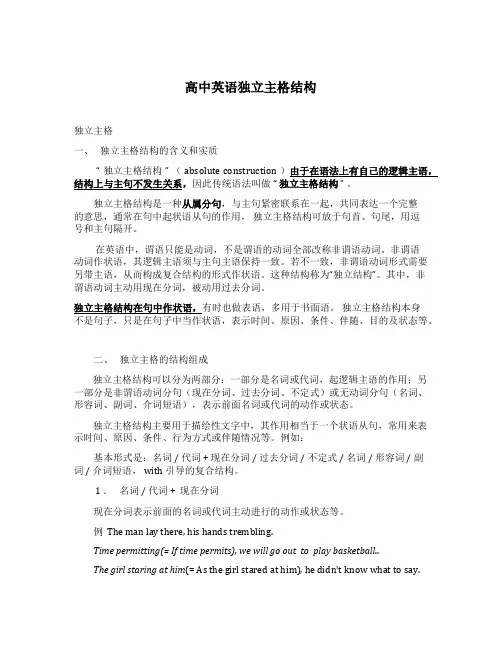
高中英语独立主格结构独立主格一、独立主格结构的含义和实质“ 独立主格结构” ( absolute construction )由于在语法上有自己的逻辑主语,结构上与主句不发生关系,因此传统语法叫做“ 独立主格结构” 。
独立主格结构是一种从属分句,与主句紧密联系在一起,共同表达一个完整的意思,通常在句中起状语从句的作用,独立主格结构可放于句首、句尾,用逗号和主句隔开。
在英语中,谓语只能是动词,不是谓语的动词全部改称非谓语动词。
非谓语动词作状语,其逻辑主语须与主句主语保持一致。
若不一致,非谓语动词形式需要另带主语,从而构成复合结构的形式作状语。
这种结构称为“独立结构”。
其中,非谓语动词主动用现在分词,被动用过去分词。
独立主格结构在句中作状语,有时也做表语,多用于书面语。
独立主格结构本身不是句子,只是在句子中当作状语,表示时间、原因、条件、伴随、目的及状态等。
二、独立主格的结构组成独立主格结构可以分为两部分:一部分是名词或代词,起逻辑主语的作用;另一部分是非谓语动词分句(现在分词、过去分词、不定式)或无动词分句(名词、形容词、副词、介词短语),表示前面名词或代词的动作或状态。
独立主格结构主要用于描绘性文字中,其作用相当于一个状语从句,常用来表示时间、原因、条件、行为方式或伴随情况等。
例如:基本形式是:名词 / 代词 + 现在分词 / 过去分词 / 不定式 / 名词 / 形容词 / 副词 / 介词短语, with 引导的复合结构。
1 .名词 / 代词 + 现在分词现在分词表示前面的名词或代词主动进行的动作或状态等。
例 The man lay there, his hands trembling.Time permitting(= If time permits), we will go out to play basketball..The girl staring at him(= As the girl stared at him), he didn't know what to say.注:“ 独立结构” 中的 being 或 having been 有时可以省去,这样就成了无动词分句或过去分词分句。
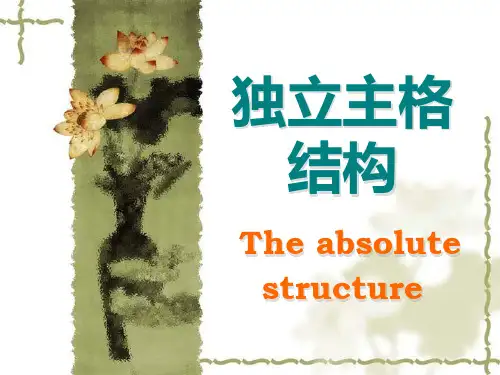
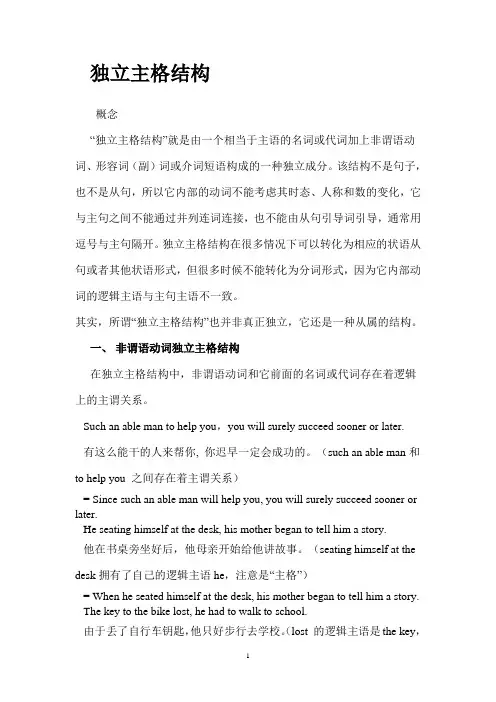
独立主格结构概念“独立主格结构”就是由一个相当于主语的名词或代词加上非谓语动词、形容词(副)词或介词短语构成的一种独立成分。
该结构不是句子,也不是从句,所以它内部的动词不能考虑其时态、人称和数的变化,它与主句之间不能通过并列连词连接,也不能由从句引导词引导,通常用逗号与主句隔开。
独立主格结构在很多情况下可以转化为相应的状语从句或者其他状语形式,但很多时候不能转化为分词形式,因为它内部动词的逻辑主语与主句主语不一致。
其实,所谓“独立主格结构”也并非真正独立,它还是一种从属的结构。
一、非谓语动词独立主格结构在独立主格结构中,非谓语动词和它前面的名词或代词存在着逻辑上的主谓关系。
Such an able man to help you,you will surely succeed sooner or later.有这么能干的人来帮你, 你迟早一定会成功的。
(such an able man和to help you 之间存在着主谓关系)= Since such an able man will help you, you will surely succeed sooner or later.He seating himself at the desk, his mother began to tell him a story.他在书桌旁坐好后,他母亲开始给他讲故事。
(seating himself at the desk拥有了自己的逻辑主语he,注意是“主格”)= When he seated himself at the desk, his mother began to tell him a story. The key to the bike lost, he had to walk to school.由于丢了自行车钥匙,他只好步行去学校。
(lost 的逻辑主语是the key,lost 也可以用完成式having been lost)= Because the key to the bike had been lost, he had to walk to school.A.不定式“独立主格结构”在“逻辑主语+动词不定式”结构中,动词不定式和它前面的名词或代词存在着逻辑上的主谓关系。
第八章独立主格结构非谓语动词作状语时,它的逻辑主语应该是句子的主语。
但有时非谓语动词带有自己的主语,从而在结构上与主语不发生关系,我们称之为独立主格结构(Absolute Construction)。
其实,所谓“独立主格结构”也并非真正独立,它还是一种从属的结构。
一、非谓语动词独立主格结构在独立主格结构中,非谓语动词和它前面的名词或代词存在着逻辑上的主谓关系。
Such an able man to help you,you will surely succeed sooner or later.有这么能干的人来帮你, 你迟早一定会成功的。
(such an able man和to help you 之间存在着主谓关系)= Since such an able man will help you, you will surely succeed sooner or later.He seating himself at the desk, his mother began to tell him a story.他在书桌旁坐好后,他母亲开始给他讲故事。
(seating himself at the desk拥有了自己的逻辑主语he,注意是“主格”)= When he seated himself at the desk, his mother began to tell him a story.The key to the bike lost, he had to walk to school.由于丢了自行车钥匙,他只好步行去学校。
(lost 的逻辑主语是the key,lost 也可以用完成式having been lost)= Because the key to the bike had been lost, he had to walk to school.A.不定式“独立主格结构”在“逻辑主语+动词不定式”结构中,动词不定式和它前面的名词或代词存在着逻辑上的主谓关系。
高中英语知识点归纳独立主格结构的构成与应用高中英语知识点归纳:独立主格结构的构成与应用独立主格结构是英语语法中的一种常见结构,它由名词或代词加上现在分词或过去分词构成,起到修饰句子其他成分或表达某种程度的状态或情感的作用。
在句子中,独立主格结构位于主句之外,通常用逗号与主句分开。
独立主格结构是高中英语考试中常常涉及的一个知识点,理解和掌握其构成和应用对于英语学习者来说至关重要。
本文将对独立主格结构的构成和应用进行归纳总结。
一、独立主格结构的构成独立主格结构由以下两部分构成:1. 名词或代词:独立主格结构的首部是一个名词或代词,代表着某个人、事物或概念。
2. 现在分词或过去分词:独立主格结构的尾部是一个现在分词或过去分词,表示该名词或代词所承担的动作或状态。
例如:1. 他站在门口,双手插袋,眼神呆滞。
这里,“他”是名词,表示某个人;“站”是现在分词,表示动作;整个结构“他站在门口,双手插袋,眼神呆滞”构成独立主格结构。
2. 天气变暖,花鸟时节又来临了。
这里,“天气”是名词,表示某个事物;“变暖”是现在分词,表示状态;整个结构“天气变暖,花鸟时节又来临了”构成独立主格结构。
二、独立主格结构的应用独立主格结构在句子中有多种应用方式,主要包括以下几个方面:1. 表达伴随状态:独立主格结构可以用来表达句子主语的伴随状态,起到修饰或补充的作用。
例如:- 他们面对困难,毫不退缩。
- 她举着小花,微笑着招手。
2. 表示原因或理由:独立主格结构可以用来表示句子中某个动作或状态的原因或理由。
例如:- 天气寒冷,路上的行人渐渐减少。
- 时间紧迫,我们必须加快工作的进度。
3. 强调句子中的主语:独立主格结构可以用来强调句子的主语,使主语更加突出,给人深刻的印象。
例如:- 他的成绩优异,全校都知道。
- 他的演讲令人振奋,大家纷纷鼓掌。
4. 表示结果或后果:独立主格结构可以用来表示某个动作或状态的结果或后果。
例如:- 失去父母的关爱,他长大后变得孤僻。
高中英语语法独立主格结构知识点总结高中英语语法独立主格结构知识点总结在高中英语语法学习中,独立主格结构是一个比较重要的概念。
独立主格结构是英语中的一种非常常见的语法结构。
学生们掌握了这种语法结构,可以更有效地理解和运用英语,提高英语写作和表达能力。
本文将从什么是独立主格结构,独立主格结构的形式和使用方法,以及独立主格结构的注意事项三个方面来对独立主格结构进行总结。
一、什么是独立主格结构独立主格结构是英语中的一种短语结构,一般由名词或代词+ v-ing, v-ed, v-en 等过去分词/现在分词构成,作状语,表示动作发生的时间、原因、条件、结果等状况。
独立主格结构不需要和主语、谓语、宾语相互连接,可以单独存在于一个句子中,用来修饰整个句子或表示附加的信息。
通常用逗号将独立主格结构与整个句子隔开。
例如:- 听到这个消息,他非常惊讶。
Hearing the news, he was very surprised.- 天气很晴朗,阳光明媚,大道上行人如织。
The weather is sunny, the sun is shining, and the pedestrians on the avenue are crowded.二、独立主格结构的形式和使用方法独立主格结构通常由名词或代词和动词-ing, -ed, -en等过去分词/现在分词构成,这种结构在英语中较为常见,经常用于表达附加的信息,并且在句子中常常被用作修饰语。
独立主格结构在英语写作中通常用来丰富文章的表达形式和简明表达。
例如:- 看到这张照片,我一下子就想到了我那些美好的回忆。
Seeing this picture, I was immediately reminded of my happy memories.- 考虑到这个问题非常复杂,我们需要更多的时间来解决它。
Considering that the problem is very complex, we need more time to solve it.值得注意的是,独立主格结构要注意它的使用方法。
独立主格结构:独立主格结构,又叫独立结构(absolute construction).它在句法上游离与句子主体之外,跟主句没有任何语法联系;但在意义上却与主句紧密联系在一起,给他构成一个完整的寓意环境。
独立主格结构没有主语和位于,只有逻辑上的主语,因此,它在句法上不是句子,而是一个独立于句子成分之外的独特结构形式。
独立主格结构可置于句首、句尾,用逗号上与主句隔开。
一、独立主格结构的形式独立结构可分为俩部分,一部分事名词或代词(主格),起着逻辑主语的作用;另一部分由形容词、副词、名词、分词、不定式、介词短语等构成,表示前面名词或代词的状态或动作。
1)名词/代词+形容词I heard that she got injured in the accident , my heart full of worry. 我听说她在这次事故中受了伤,内心充满担忧。
He stood silent in the moon-light, his door open .月光下,门开着,他默默地站在那。
2)名词/代词+现在分词Winter coming ,it gets colder and colder. 冬天来了,天气越来越冷了。
The rain having stopped ,he went out for a walk. 雨停了,他出去散散步。
3)名词/代词+过去分词More time given ,we should have done it much better. 如果给我们更多时间,我们会做的更好。
The boy stood there , his right hand raised. 那个男生站在那里,右手高举。
4)名词/代词(主格)+不定式Here are the first two volumes , the third one to come out next month.这是前俩卷,第三卷将于下雨问世。
高中英语知识点:独立主格结构什么是独立主格结构?独立主格结构是英语语法中的一个特殊结构,由一个名词或代词和一个动词的现在分词形式而成。
这个结构在句子中无法被省略,但也不属于主语、宾语、或其他从句。
通常用于强调一个动作或状态,或用来表示补充说明。
例如:•时间一到,他的心情就异常兴奋,站在门口等待着来访的朋友。
在上面的句子中,独立主格结构是“站在门口等待着来访的朋友”,它的作用是为前面的句子“时间一到,他的心情就异常兴奋”提供进一步的解释说明。
独立主格结构的组成一般来说,独立主格结构由一个名词或代词和一个动词的现在分词形式组成。
名词或代词是独立主格的核心,而动词的现在分词形式则指出了该核心所表示的动作或状态。
下面是一些例子:•你的祝福,让我无比感动。
•天气晴朗,我们决定出去玩。
•大雨倾盆,我们只能坐在车里等。
在上面的例子中,独立主格的核心是“你的祝福”,“天气晴朗”,和“大雨倾盆”,而后面的动词分别是“让我无比感动”,“决定出去玩”,和“我们只能坐在车里等”。
独立主格的用法独立主格结构可以用于许多不同的情形,通常用于以下几种情况:补充说明或修饰独立主格结构常常用于对主句进行补充说明或修饰。
它可以提供进一步的信息,使句子更加清晰、生动。
例如:•星期天早上,阳光明媚,鸟儿在树上欢快地唱着歌。
•在校园里,我们看到了绿树成荫,芳草萋萋的美景。
•他回到家里,发现屋子里一片狼藉。
在上述句子中,独立主格结构分别是“阳光明媚”,“绿树成荫,芳草萋萋的美景”,和“屋子里一片狼藉”,它们都用来修饰或补充主句。
强调独立主格结构也可以用于强调一个动作或状态。
这个结构可以使句子更加生动有力。
例如:•饭菜已经凉了,可客人依然在等待着。
•彩虹横跨天际,惊艳了所有路过的人。
•学生们排队等候进入教室,教师却迟迟未到。
在上面的句子中,独立主格结构分别是“客人依然在等待着”,“惊艳了所有路过的人”,和“教师却迟迟未到”,它们都用来强调相应的动作或状态。
独立主格结构非谓语动词作状语时,它的逻辑主语应该是句子的主语。
但有时非谓语动词带有自己的主语,从而在结构上与主语不发生关系,我们称之为独立主格结构(Absolute Construction)。
其实,所谓“独立主格结构”也并非真正独立,它还是一种从属的结构。
一、非谓语动词独立主格结构在独立主格结构中,非谓语动词和它前面的名词或代词存在着逻辑上的主谓关系。
Such an able man to help you,you will surely succeed sooner or later.有这么能干的人来帮你, 你迟早一定会成功的。
(such an able man和to help you 之间存在着主谓关系)= Since such an able man will help you, you will surely succeed sooner or later.He seating himself at the desk, his mother began to tell him a story.他在书桌旁坐好后,他母亲开始给他讲故事。
(seating himself at the desk拥有了自己的逻辑主语he,注意是“主格”)= When he seated himself at the desk, his mother began to tell him a story.The key to the bike lost, he had to walk to school.由于丢了自行车钥匙,他只好步行去学校。
(lost 的逻辑主语是the key,lost 也可以用完成式having been lost)= Because the key to the bike had been lost, he had to walk to school.A.不定式“独立主格结构”在“逻辑主语+动词不定式”结构中,动词不定式和它前面的名词或代词存在着逻辑上的主谓关系。
这种结构也可用一个从句或并列分句来表达。
1.动词不定式用主动的形式在独立主格结构中,动词不定式和它前面的名词或代词存在着逻辑上的主谓关系。
His mother to come tonight,he is busy preparing the dinner.他母亲今晚要来,他正在忙着准备饭菜。
(= As his mother is to come tonight, he is busy preparing the dinner.)——will you go to the comcert tonight 你今晚去听音乐会吗?——sorry.So many exerise-books to check,I rially can't afford any time.对不起,有这多的作业要批,我真的抽不出时间。
(=Because I shall check so many exercise-books tonight,I really can't afford any time.)The four of us agreed on a division of labour,each to translate a quarter of the book.我们四人同意分工干,每人翻译全书的四分之一。
(=The four of us agreed on a division of labour and each is to translate a quarter of the book.)Many trees,flowers,and grass to be planted,our newly-built school will look even more beautiful. 种上许多的树,花和草后,我们新建的学校将看上去更美。
(=If many trees,flowers,and grass are planted,our newly-built school will look even more beautiful.)B.-ing形式“独立主格结构”动词的-ing形式作状语时,其逻辑主语一般应与句子的主语保持一致。
Being ill, he went home.由于生病,他回家了。
(= As he was very ill, he went home.)Seating himself at the desk, he began to read a magazine.在课桌旁坐好后,他开始看杂志。
(= When he had seated himself at the desk, he began to read a magazine.)1.表示时间的-ing形式作“独立主格结构”Everyone being ready, the teacher began his class.每个人都准备好后,老师开始上课。
(相当于一个时间状语从句When everyone wasready)The chairman began the meeting , everyone being seated.每个人坐好后,主席开始开会。
(相当于一个时间状语从句after everyone was seated)2.表示原因的-ing形式作“独立主格结构”The boy leading the way, we had no trouble finding the strange cave. 由那个男孩带路,我们没有困难就找到了那奇怪的洞。
(相当于一个原因状语从句Because the boy led the way)Many eyes watching him, he felt a bit nervous. 许多眼睛看着他,他感到有点儿紧张。
(相当于一个原因状语从句As many eyes were watching him)必背:含有being的独立主格结构。
It being National Day today,the streets are very crowded. 今天是国庆节,街上很拥挤。
= As it is National Day today, the streets are very crowded.There being no further business to discuss, we all went home. 没有别的事可讨论,我们都回家了。
= As there was no further business to discuss, we all went home.3.表示条件的-ing形式作“独立主格结构”Time permitting, we will have a picnic next week.时间允许的话,我们下星期将进行一次野炊。
(相当于一个条件状语从句If timepermits)My health allowing, I will work far into the night.我的健康许可的话,我愿工作到深夜。
(相当于一个条件状语从句If my health allows)4.表示方式的-ing形式作“独立主格结构”The students are walking in the school happily, each wearing a card in front of his chest.学生们快乐地在学校里走着,每个人胸前都带着一张卡。
(相当于一个并列分句and each wears a card in front of his chest)The boy lay on the grass, his eyes looking at the sky.男孩躺在草地上,眼睛看着天空。
(相当于一个并列分句and his eyes were looking at the sky)C.-ed形式“独立主格结构”与逻辑主语+动词的-ing形式一样,如果-ed形式的逻辑主语和句子的主语不一致的话,就需要用-ed形式的独立主格结构。
The book written in simple English, English beginners were able to read it.该书是用简单英语写的,英语初学者也能看懂。
= As the book was written in simple English,English beginners were able to read it.The workers worked still harder, their living conditions greatly improved.由于工人们的生活条件大大提高,他们工作得更起劲了。
= As their living conditions were greatly improved, the workers worked still harder.He was listening attentively in class, his eyes fixed on the blackboard.他上课专心听讲,眼睛紧盯着黑板。
= He was listening attentively in class, and his eyes were fixed on the blackboard.The task completed,he had two months' leave.任务完成以后,他休了两个月的假。
(=When the task had been completed,he had two months' leave.)比较:动词不定式表示动作没有发生或即将发生,动词-ed形式表示动作已经结束,动词-ing形式往往表示动作正在进行。
The manager looks worried,many things to settle. 经理看上去很着急, 有这么多的事情要处理。
(事情还没有处理,而且是由经理本人来处理,用不定式to settle)The manager looks relaxed, many things settled. 许多事情已经处理好了,经理看上去很轻松。
(事情已经处理好了,用动词-ed形式settled表示动作已经结束)The food being cooked, the boy was watching TV. 小孩一边做饭,一边看电视。
(两个动作同时进行)The food cooked, the boy went to bed. 饭做好了,小孩去睡了。